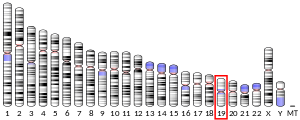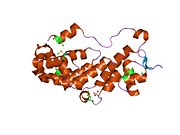From Wikipedia, the free encyclopedia
Protein-coding gene in the species Homo sapiens
EIF3K Identifiers Aliases EIF3K External IDs OMIM : 609596 ; MGI : 1921080 ; HomoloGene : 8292 ; GeneCards : EIF3K ; OMA :EIF3K - orthologs Wikidata
Eukaryotic translation initiation factor 3 subunit K (eIF3k ) is a protein that in humans is encoded by the EIF3K gene .[ 5] [ 6] [ 7]
The ~800 kDa eukaryotic initiation factor 3 (eIF3) is the largest eIF and contains at least 12 subunits, including eIF3k/EIF2S12. eIF3 plays an essential role in translation by binding directly to the 40S ribosomal subunit and promoting formation of the 43S preinitiation complex .[ 8] [ 7]
eIF3k has been shown to interact with Cyclin D3 [ 9] eIF3a .[ 6] [ 10]
^ a b c ENSG00000282986 GRCh38: Ensembl release 89: ENSG00000178982, ENSG00000282986 – Ensembl , May 2017^ a b c GRCm38: Ensembl release 89: ENSMUSG00000053565 – Ensembl , May 2017^ "Human PubMed Reference:" . National Center for Biotechnology Information, U.S. National Library of Medicine .^ "Mouse PubMed Reference:" . National Center for Biotechnology Information, U.S. National Library of Medicine .^ Zhang QH, Ye M, Wu XY, Ren SX, Zhao M, Zhao CJ, et al. (October 2000). "Cloning and functional analysis of cDNAs with open reading frames for 300 previously undefined genes expressed in CD34+ hematopoietic stem/progenitor cells" . Genome Research . 10 (10): 1546–60. doi :10.1101/gr.140200 . PMC 310934 PMID 11042152 . ^ a b Mayeur GL, Fraser CS, Peiretti F, Block KL, Hershey JW (October 2003). "Characterization of eIF3k: a newly discovered subunit of mammalian translation initiation factor elF3" . European Journal of Biochemistry . 270 (20): 4133–9. doi :10.1046/j.1432-1033.2003.03807.x PMID 14519125 . ^ a b "Entrez Gene: EIF3S12 eukaryotic translation initiation factor 3, subunit 12" .^ Mayeur GL, Fraser CS, Peiretti F, Block KL, Hershey JW (2003). "Characterization of eIF3k: a newly discovered subunit of mammalian translation initiation factor elF3" . European Journal of Biochemistry . 270 (20): 4133–9. doi :10.1046/j.1432-1033.2003.03807.x PMID 14519125 . ^ Shen X, Yang Y, Liu W, Sun M, Jiang J, Zong H, Gu J (August 2004). "Identification of the p28 subunit of eukaryotic initiation factor 3 (eIF3k) as a new interaction partner of cyclin D3" . FEBS Letters . 573 (1–3): 139–46. doi :10.1016/j.febslet.2004.07.071 PMID 15327989 . S2CID 16005938 . ^ Ewing RM, Chu P, Elisma F, Li H, Taylor P, Climie S, et al. (2007). "Large-scale mapping of human protein-protein interactions by mass spectrometry" . Molecular Systems Biology . 3 (1): 89. doi :10.1038/msb4100134 . PMC 1847948 PMID 17353931 .
Karki S, Ligon LA, DeSantis J, Tokito M, Holzbaur EL (May 2002). "PLAC-24 is a cytoplasmic dynein-binding protein that is recruited to sites of cell-cell contact" . Molecular Biology of the Cell . 13 (5): 1722–34. doi :10.1091/mbc.02-02-0011 . PMC 111139 PMID 12006665 . Wei Z, Zhang P, Zhou Z, Cheng Z, Wan M, Gong W (August 2004). "Crystal structure of human eIF3k, the first structure of eIF3 subunits" . The Journal of Biological Chemistry . 279 (33): 34983–90. doi :10.1074/jbc.M405158200 PMID 15180986 . Shen X, Yang Y, Liu W, Sun M, Jiang J, Zong H, Gu J (August 2004). "Identification of the p28 subunit of eukaryotic initiation factor 3(eIF3k) as a new interaction partner of cyclin D3" . FEBS Letters . 573 (1–3): 139–46. doi :10.1016/j.febslet.2004.07.071 PMID 15327989 . S2CID 16005938 . Olsen JV, Blagoev B, Gnad F, Macek B, Kumar C, Mortensen P, Mann M (November 2006). "Global, in vivo, and site-specific phosphorylation dynamics in signaling networks" . Cell . 127 (3): 635–48. doi :10.1016/j.cell.2006.09.026 PMID 17081983 . S2CID 7827573 .
Overview of all the structural information available in the PDB for UniProt : Q9UBQ5 PDBe-KB .








